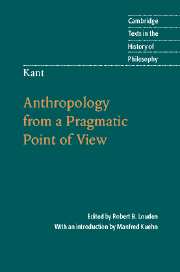Book contents
- Frontmatter
- Contents
- Introduction
- Chronology
- Further reading
- Note on the text and translation
- Anthropology from a Pragmatic Point of View
- Preface
- Contents
- Part I Anthropological Didactic. On the way of cognizing the interior as well as the exterior of the human being
- Part II Anthropological Characteristic. On the way of cognizing the interior of the human being from the exterior
- Index
- Cambridge Texts in the History of Philosophy
Introduction
Published online by Cambridge University Press: 05 June 2012
- Frontmatter
- Contents
- Introduction
- Chronology
- Further reading
- Note on the text and translation
- Anthropology from a Pragmatic Point of View
- Preface
- Contents
- Part I Anthropological Didactic. On the way of cognizing the interior as well as the exterior of the human being
- Part II Anthropological Characteristic. On the way of cognizing the interior of the human being from the exterior
- Index
- Cambridge Texts in the History of Philosophy
Summary
The origins of Anthropology from a Pragmatic Point of View
Anthropology as understood today is a discipline concerned with the study of the physical, cultural, social, and linguistic development of human beings from prehistoric times to the present. It is a relatively new phenomenon, which came into its own only during the early nineteenth century. Its roots, however, can be traced back to the last third of the eighteenth century. Voltaire, Montesquieu, and Condorcet in France, Lord Kames, Lord Monboddo, and William Robertson in Scotland, and Immanuel Kant, Georg Forster, Christoph Meiners, and Ernst Platner in Germany were among the most important early contributors to this new field of study. It grew ultimately from a fundamental concern of the European Enlightenment, being conceived as an alternative to the theological understanding of the nature of man and born of the belief that the proper study of mankind is man, not God.
Kant fully subscribed to this Enlightenment conception, even though, as we shall also see, he did not want to deny that theological concerns were very important for the proper understanding of human nature. He was, in any case, one of the first thinkers ever to lecture on anthropology as an independent academic discipline at university level. Though the Anthropology from a Pragmatic Point of View was published at the end of the eighteenth century in 1798, he had by then already lectured on it for twenty-five years.
Information
- Type
- Chapter
- Information
- Kant: Anthropology from a Pragmatic Point of View , pp. vii - xxixPublisher: Cambridge University PressPrint publication year: 2006
